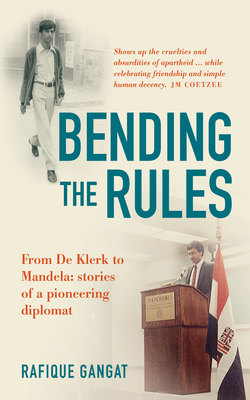Читать книгу Bending the Rules - Rafique Gangat - Страница 14
На сайте Литреса книга снята с продажи.
WAR ON COMMUNISM
ОглавлениеMilitary Intelligence: an oxymoron
Dave Mannery and Phil Tetley were extraordinary guys and, in heart and spirit, were true South Africans. I got to know them at university. They lived on a farm in Pietermaritzburg’s Chase Valley; in a traditional African hut they had built themselves. Later, they progressed to a tree house up in the mountains.
Their dream was to live frugally, save as much as they could and, after graduating, hike around Europe, then buy two Arabian horses in Egypt and ride down the African continent. Believe it or not, they partly realised that dream, aborting it only in Zimbabwe after they fell gravely ill.
I spent many interesting times with them, listening to their fascinating stories, especially about the vacation work they did for the South African Parks Board in Namibia’s Caprivi Strip. They worked in the middle of a conflict zone – what one side saw as a war of liberation, and the other as a war against communism. They were neutral, their sole concern being to protect the wildlife. In doing so, they developed an objective view of the conflict, which I was interested to hear in contrast to the usual rhetoric dished up by the state-controlled media.
The day they moved out of their hut into the tree house, I was one of many friends (but the only non-white) who gave them a hand. They had brought back some empty mortar shells from the Caprivi, which they cleverly used for storing their grains. Together with all their other belongings, we loaded these shells onto the back of a truck and hauled everything up the mountain to their newly built tree house.
After off-loading all the stuff, we sat around on the grass below the tree house and smoked a joint – our reward for the hard day’s work.
They then related an amusing story about how military intelligence had imitated the Americans in Vietnam in their belief that to win the war they had to win the hearts and minds of the locals. Firstly, all soldiers on active duty in the strip had been instructed to share their rations with locals whenever they came across them. In theory it sounded fine, but soon soldiers found themselves swamped by locals demanding their rations. The order to share was swiftly abandoned. Then the generals learnt that there were some graduates from South Africa’s leading agricultural colleges in the unit and this inspired a different plan to win local hearts and minds. They brought in tractors, ploughed the lands and then supplied mealies for the locals to plant. To their surprise the locals did not do as anticipated, saying it was not they who had dug up the land in the first instance so why should they do the planting. Eventually the army planted the mealies for them. When the crop was ready to harvest, the locals were told to do the necessary. Once more they responded with, “We did not plant the mealies, why should we harvest them? You did; you should!”
So the army harvested the entire crop, which they bagged and delivered to the locals, who in turn sold it for a profit. From this experience, the boys from military intelligence learnt that the American formula of “winning hearts and minds” was not going to work in the African context. They gave up as fast as they had initiated the programme. To everyone’s surprise, a year later the locals arrived at the army base wanting to know why the army was late in planting the new crop, as they were eagerly waiting for them to do so.
As we laughed ourselves silly at the expense of the South African military, we were suddenly surrounded by a bunch of soldiers who had silently sneaked up on us, armed and in an extremely aggressive mode. One moment we were laughing at them and the next we were facing their guns. It was surreal. As I was the only non-white in the group, the soldiers pointed their weapons at me. I had the joint in my hand and, not knowing what else to do, I said, “Busted!”
We were commanded to put our hands on the back of our heads and lie down on the grass, while they searched the place upside down. Before they left, they told us that military intelligence had been monitoring the surrounding areas and, having noticed the shells being loaded and taken up the mountainside on the very day the president of the country was attending the opening of the Royal Agricultural Show in Pietermaritzburg, they had been obliged to act. They’d thought communists were about to launch mortars on the agricultural show grounds, endangering the life of the head of state.
The joint was the least of their concerns and, when they finally left, we smoked another. Having had a double dose of military intelligence – as retold and then experienced – we understood the real meaning of the term oxymoron.
